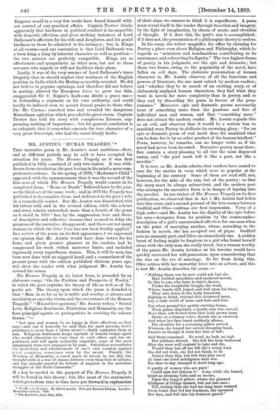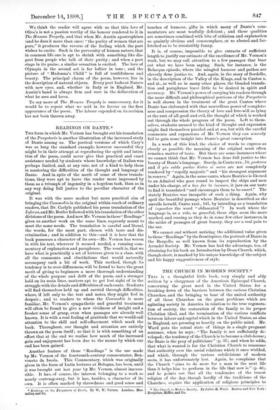MR. AUSTIN'S " HUMAN TRAGEDY."*
THIS narrative poem is Mr. Austin's most ambitious effort,
and at different periods may be said to have occupied his attention for years. The Human Tragedy as it was first published in 1862, consisted of only two cantos. It was with- drawn from circulation, the poet having in his mind a more com- prehensive scheme. In the spring of 1873, " Madonna's Child" appeared, with the announcement that it was the second of the four acts of which The Human Tragedy would consist in its completed form. " Rome or Death" followed later in the year, as the third act of the same work ; and in 1876 the Tragedy was published in its complete form, and dedicated to the poet's wife in a remarkable sonnet. But Mr. Austin was dissatisfied with his labour still, and in the revised edition, while the scheme and story remain untouched, more than a fourth of the poem as it stood in 187d " has, by the suppression, here and there, of descriptive and reflective stanzas that seemed to delay the progress of the narrative, disappeared ; and there are not many
stanzas to which the labor Maw has not been freshly applied." In a review of the poem on its first appearance, t we expressed our opinion that Mr. Austin would have done better for his fame, and given greater pleasure to his readers, had he compressed his work within narrower limits, and excluded rigorously every superfluous stanza. This, it will be seen, has been now done with no niggard hand, and a comparison of the
present poem with the edition published thirteen years ago, will show the reader with what judgment Mr. Austin has revised his verses.
The Human Tragedy, in its latest form, is preceded by an elaborate essay, On the Position and Prospects of Poetry," in which the poet explains his theory of life as well as of the poetic art. The theory upon which the poem is founded is that " Man, in so far as he is noble and worthy. is always and inevitably at once the victim and the executioner of the Human Tragedy." " His noblest passions," Mr. Austin writes, " Sexual Love, Religious Sentiment, Patriotism and Humanity, are the four principal agents or protagonists in evolving the solemn drama : "-
" Let men and women he as happy in their affections as they may—and can it honestly be said that, for most persons, love's sweetness is more than a bitter sweet ?—death separates them at last. Religious Sentiment keeps myriads of human beings apart who would otherwise be very close to each other, and has en- gendered, and will again assuredly engender, some of the most sanguinary wars ever engaged in by man. Patriotism necessitates the protection and advancement of one's own country against other countries, sometimes even by the sword. Finally, the Worship of Humanity, a creed much in favour in our day, has brought with it a war of classes bitterer even than that of nations, and has already exacted its tribute of anguish in the merciless struggles of the Paris Commune."
If a key be needed to the purport of The Human Tragedy, it will be found in this theory; but, like most of the statements which poets from time to time have put forward in explanation
• The Nu•..an Tragedy. By Alfred Austin. New and Revised Edition. London Macmillan and Co. 1849.
t The Spectator, June 24th, 1876.
of their aims, we venture to think it is superfluous. A poem must reveal itself to the reader through its action and imagery, by the light of imagination, by charm of music, and elevation of thought. If it does this, the poet's aim is accomplished ; if it does not, the presentation of a philosophic theory is useless. In his essay, the writer magnifies his office by claiming for Poetry a place even above Religion and Philosophy, which he regards as "ministers and handmaidens contributing to its sustenance and subserving its dignity." The two highest forms of poetry, in his judgment, are the epic and dramatic ; but these two forms, owing to the popularity of the novel, have fallen on evil days. The elaborate presentation of human character is, Mr. Austin observes, of all the functions and powers of literature, the one most valued by modern readers ; and " whether they be in search of an exciting story, or of elaborately analysed human characters, they find what they want in novels far more completely than in poetry, and so they end by discarding the poem in favour of the prose romance." Moreover, epic and dramatic poems necessarily treat of something more than the passions and fate of individual men and women, and that "something more" does not attract the modern reader. Mr. Austin regards this as an evil, and observes that it would be a serious loss to mankind were Poetry to abdicate its crowning glory; "for an epic or dramatic poem of real merit does for mankind what can be done for it by no other product of the human intellect." Poets, however, he remarks, can no longer write as if the novel had never been invented. Narrative poetry must there- fore contain a story pleasing to all but the most depraved tastes, and " the poet must tell it like a poet, not like a novelist."
It is true, as Mr. Austin admits, that readers have ceased to care for the stories in verse which were so popular at the beginning of the century. Some of them are read still, not, however, for the sake of the tale, but of the poetry; so that the story must be always subservient, and the modern poet who attempts the narrative form is in danger of lapsing into the novelist. In our review of The Human Tragedy on its first publication, we observed that in Act i. Mr. Austin had fallen into this error, and a second perusal of the love-scenes between Godfrid and Olive confirms our first impression. Verse of a high order—and Mr. Austin has the dignity of the epic before his eyes—derogates from its position by the commonplace description of a girl's unrestrained affection for one man when on the point of marrying another, whom, according to the fashion in novels, she has accepted out of pique. Godfrid acts an unmanly part, and Olive an unmaidenly one. A sudden burst of feeling might be forgiven to a girl who found herself alone with the only man she really loved ; but a woman worthy of the praise Mr. Austin lavishes on his heroine would have quickly recovered her self-possession, upon remembering that she was on the eve of marriage. So far from doing this, Olive retires with her unworthy lover into an arbour, and this is how Mr. Austin describes the scene :—
" Nothing there was he now could ask but she
Had yielded speechless and enslaved assent, So like to one who bows to fate's decree, Under the hospitable boughs she went, Where, hands still joined and laid upon his knee, They sate down in the leafy tenement, Sighing to think, beyond this cloistered mere, Lay a rude world of noise and hate and fear.
Nor when around her gently-curving frame, Their palms disjoined, a gentle arm was curved, More than soft-footed fawn that hath grown tame Starts at a human voice, shrank she or swerved, And when her face burst suddenly aflame, His shoulder for a screening pillow served, Whereon she leaned her sorrow-drooping head, Passive as though it were her bier or bed ; And there remained. No word, no look, no sigh Her stillness stirred. She felt the hour bestowed Bliss she were well content to take and die, Would they but off her lift life's weary load. She did not wish, she did not think. to lie Nearer than this, but felt that pity owed At least one brief indulgence unto woe Ere dear to-day changed to dead long ago.
0 purity of women who are pure ! Could men but fathom it ! Long while she leaned, Quiet as sleeping babe and as secure, Upon the rugged pillow, where she gleaned Glimpses of things unseen, but not less sure ; Till, feeling that she had too long been weaned From fount that fed her fondness, she upraised Her face, and full into his features gazed."
We think the reader will agree with us that this love of Olive's is not a passion worthy of the honour rendered to it in The Human Tragedy, and that when Mr. Austin apostrophises (and he does it more than once) " the purity of women that are pure," it produces the reverse of the feelie, which the poet wishes to excite. Such is the perversity of human nature, that in common life one is apt to shrink with something like dis- gust from people who talk of their• purity ; and when a poet sings in its praise, a similar sensation is excited. The love of Olympia in the second act is far loftier in tone ; and the picture of " Madonna's Child " is full of truthfulness and beauty. The principal charm of the poem, however, lies in the description of natural objects. Every poet looks at Nature with new eyes, and, whether in Italy or in England, Mr. Austin's hand is always firm and sure in the delineation of what he sees and loves.
To say more of The Human Tragedy is unnecessary, for it would be to repeat what we said in its favour on the first appearance of the poem. The labour expended on its revision has not been thrown away.











































 Previous page
Previous page